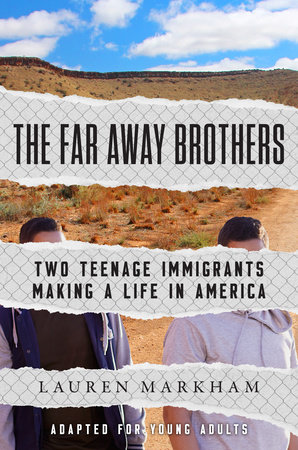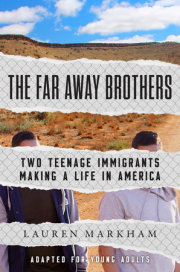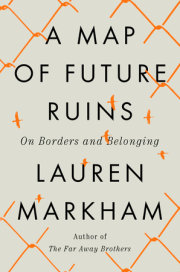“You boys from eighteen?” one of the young men asked, pointing his gun toward a graffiti tag on the wall: barrio 18.
It was 2008. The Flores twins, twelve, were playing cards on the town soccer field with their brother and friends when a pickup pulled up. Ten or so guys sporting baggy clothes and tattoos stood in the truck bed with guns and machetes. They were MS-13, or Mara Salvatrucha, the twins knew--members of the notorious gang. The MS-13 was showing up more and more in La Colonia, the small town where the Flores boys lived. The twins and their friends were high on adrenaline from having won a soccer match that morning. But the sight of the armed men scared them silent.
They shook their heads.
Ernesto’s gaze was lowered, but he could feel the men staring down at him.
“I asked if you fuckers were from eighteen!” the man shouted. At that, one of the twins’ friends took off running into the woods. Suddenly Ernesto and Raúl were sprinting through the forest that flanked the town soccer field--Ernesto first, Raúl close behind--panting and crashing through the tall grasses while shouts and a scatter of gunshots crackled behind them.
Running away from a truck full of MS-13 gangsters was a risky choice. It either showed the kids’ allegiance to the rival Barrio 18 gang or, at the very least, a lack of respect for MS-13.
When the shouts sounded far enough away, the twins hit the ground, lying on their bellies in the brush. They stayed there for what felt like hours--until they were sure the truck was gone.
The road to La Colonia weaves through a tangle of greenery: there are vines overhead, and tall, tight rows of banana trees, canopies of barillos, pink flowering cacao, and flourishing palms. La Colonia--which is about thirty miles from San Salvador and home to fewer than four thousand people--spreads up and around the slopes of a gentle, low hill.
The houses along the road are simple but comfortable, built from concrete, many of them painted colors that were once bright--ice blue, cotton-candy pink. Less fortunate homes dot the nearby hills and farmland. Flags of the ARENA conservative party flap from poles. Along the road stand La Colonia’s schools--two high schools and an elementary school. One of only about a dozen Flores family photos is of the twins and their older sister, somber-faced and gangly beneath too-big dress clothes, on the proud occasion of Ernesto and Raúl’s ninth-grade graduation.
Cows use the road as often as people do, plodding along between farm and pasture. During harvest time, families lay their bean pods and corn out to dry on the pavement, the kernels spread out like a mosaic.
The road crests the hill and then dips downward, and that’s where the Flores home sits, a stone house lined with crumbling stucco. From there it’s not much farther to the center of town, a sleepy square rimmed by a block or two of houses and a few businesses--family-run restaurants, shops, the mayor’s office. The high-rising church is the town’s main attraction.
Until the twins were teenagers, the town center was busy day and night. Kids ran around the playground or played soccer. Those who’d begged spare change from their parents bought snow cones from the woman with the stand. The pupuserías were open until midnight, playing music and serving sodas and beers, the proprietors flipping the cakes of corn masa against the griddle until the edges were crispy.
“It was a beautiful town,” Raúl remembers. “It was.”
Like the rest of the farmers in La Colonia, the twins’ father, Wilber Sr., regarded the mountain and its fertile land as a divine inheritance. The land was good to him; God provided. “The way to survive this world is to stay close to God,” he said to his children. “And keep manos limpias”: clean hands.
Wilber carried a small Bible in his pocket at all times, the binding frayed and worn from use. He and his wife, Esperanza, had always wanted a big family, but for many years they’d felt they might be cursed. They got married in the midst of the country’s civil war (1980–1992), in 1985. Two years later, as the war still raged, Esperanza gave birth to their first baby, Ricardo.
It was a dirty war, as Wilber put it. On one side there was the right-wing government, loyal to those with money, and operating with brutal military force. On the other there was the growing leftist guerrilla movement, claiming to be fighting for the interests of the poor, especially the country’s rural farmers. But the Flores family thought it best to stay out of politics.
In cities and in the countryside, mutilated bodies showed up in the streets. Political prisoners were heaved off a cliff above San Salvador. Later, a 1993 report by the UN Truth Commission for El Salvador asserted that 85 percent of the atrocities were carried out by the conservative ARENA government. In fact, the United States helped to train and back these forces--death squads and all--to prevent a guerrilla takeover: an effort, in the midst of 1980s Cold War paranoia, to prevent the “spread” of Communism.
Copyright © 2019 by Lauren Markham. All rights reserved. No part of this excerpt may be reproduced or reprinted without permission in writing from the publisher.






